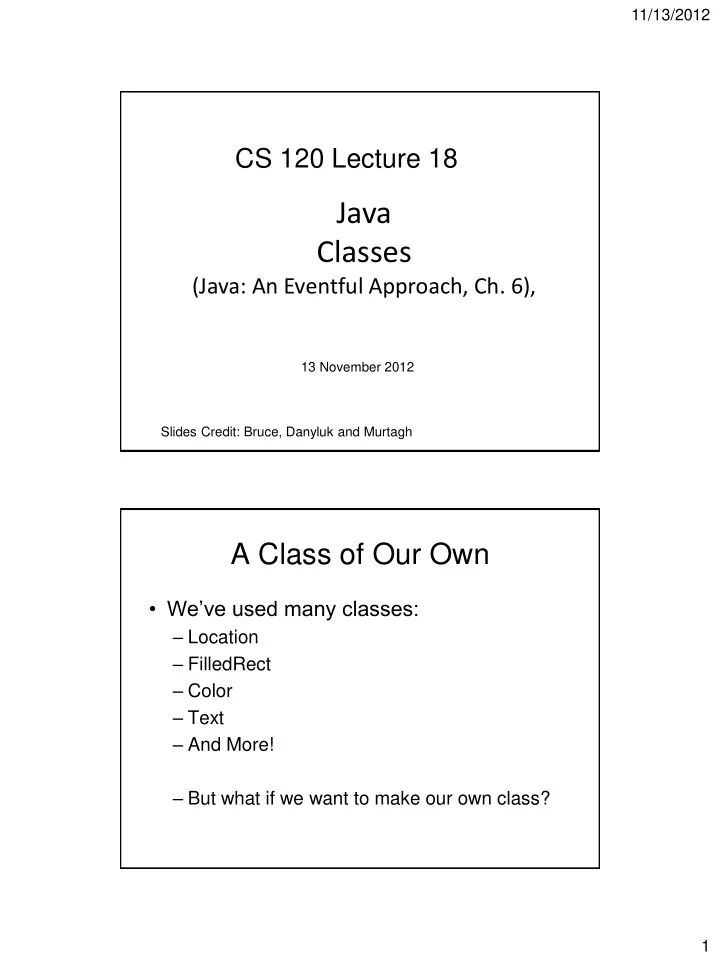

11/13/2012 CS 120 Lecture 18 Java Classes (Java: An Eventful Approach, Ch. 6), 13 November 2012 Slides Credit: Bruce, Danyluk and Murtagh A Class of Our Own • We’ve used many classes: – Location – FilledRect – Color – Text – And More! – But what if we want to make our own class? 1
11/13/2012 What if… We can free ourselves from the limitations of ovals and rectangles and move on to… A Draggable Face public class RevFaceDrag extends WindowController { private FunnyFace happy; // FunnyFace to be dragged private Location lastPoint; private boolean happyGrabbed = false; // Whether happy has been grabbed by the mouse public void begin() { // Make the FunnyFace happy = new FunnyFace( FACE_LEFT, FACE_TOP, canvas ); } public void onMousePress( Location point ){ lastPoint = point; happyGrabbed = happy.contains( point ); } public void onMouseDrag( Location point ) { if (happyGrabbed ) { happy.move( point.getX() – lastPoint.getX(), point.getY() – lastPoint.getY() ); lastPoint = point; } } } 2
11/13/2012 Making a Funny Face • Physical Characteristics: – Head – Mouth – Two Eyes • Behaviors – Can check contains – Movable (by dragging) Components of a Class • Instance Variables • Methods • Constructors (these are new!) 3
11/13/2012 Instance Variables • The data stored in a class • Maintain the state of an object • Instance variables for FunnyFace: private FramedOval head; private FramedOval mouth; private FramedOval leftEye, rightEye; Methods • Methods: Sections of code executed at certain times: – onMousePress – onMouseDrag – begin • Special Types of Methods: – Mutator Methods – Accessor Methods 4
11/13/2012 Actual Parameters • Information given to a method when the method is invoked • In the invocation of: happy.move (10, 20); – happy is the object – move is the name of the method – the values 10 and 20 are passed to happy.move • Order of parameters matters! A Mutator Method for FunnyFace //Move the entire face by (dx,dy) public void move( double dx, double dy ) { head.move( dx, dy ); leftEye.move (dx, dy ); rightEye.move( dx, dy ); mouth.move( dx, dy ); } 5
11/13/2012 Formal Parameters • dx and dy are the formal parameters • Formal Parameters: – used in the method declaration – determine the order of actual parameters – determine the type of the actual parameters Accessor Methods • Return information about an object // Determine whether pt is inside FunnyFace public boolean contains( Location pt ) { return head.contains( pt ); } 6
11/13/2012 Constructors • A constructor creates an object and initializes relevant instance variables • Invoked by the name of the class public FunnyFace( double left, double top, DrawingCanvas canvas ){ head = new FramedOval( left, top, FACE_WIDTH, FACE_HEIGHT, canvas ); mouth = new FramedOval( left+(FACE_WIDTH-MOUTH_WIDTH)/2, top+2*FACE_HEIGHT/3, MOUTH_WIDTH, MOUTH_HEIGHT, canvas ); leftEye = new FramedOval( left+EYE_OFFSET-EYE_RADIUS/2, top+2*FACE_HEIGHT/3, MOUTH_WIDTH, MOUTH_HEIGHT, canvas ); rightEye = new FramedOval( left+FACE_WIDTH-EYE_OFFSET- EYE_RADIUS/2, top+EYE_OFFSET, EYE_RADIUS, EYE_RADIUS, canvas ); } 7
11/13/2012 Class Convention public class Name { constant definitions variable declarations constructor methods } Defining Methods Indirectly • What if we wanted to move the FunnyFace to a specified location? • We can reuse methods already defined public void moveTo( double x, double y ) { this.move( x – head.getX(), y – head.getY() ); } 8
11/13/2012 this public void moveTo( double x, double y ) { this.move( x – head.getX(), y – head.getY() ); } • We can use “this” to refer to object itself Local Variables • Recall variables and their uses: – Instance Variables: maintain the state of an object – Formal Parameters: Determine the information required by a method • Local Variables: – Declared, initialized and used within a method – Locals do not retain their values between method invocations 9
11/13/2012 Using Local Variables public double elapsedMilliseconds() { // Return number of // milliseconds since last reset double diffTime; diffTime = System.currentTimeMillis() – startTime; return diffTime; } • diffTime is a local variable Using Local Variables • To simplify difficult calculations • To eliminate redundant computations 10
11/13/2012 Overloading Evaluating 5 + 7 gives 12 Evaluating "Good" + " Day" gives "Good Day" + is an overloaded operator: it can add numbers and concatenate strings • The type of operation is determined by the types of the operands Overloading II • In Java, users cannot define new overloaded operations • We can overload methods! 11
11/13/2012 Overloading III • Consider: public void moveTo( double x, double y ) { this.move( x – head.getX(), y – head.getY() ); } And public void moveTo( Location pt ) { this.move( pt.getX() – head.getX(), pt.getY() – head.getY() ); } Overloading IV • What determines when each moveTo is invoked? • Answer: The actual parameters • moveTo can be invoked either with two doubles or with a Location 12
11/13/2012 Review • Components of a class – Instance Variables – Constructors – Methods • Formal vs Actual Parameters • Instance Variables and Local Variables • Overloading Student To Do’s • HW09 – SEVEN!!!! Programs from chapter 7! • Practice examples on your own! • Read Java: An Eventful Approach – Ch. 6 (Today) 26 13
Recommend
More recommend